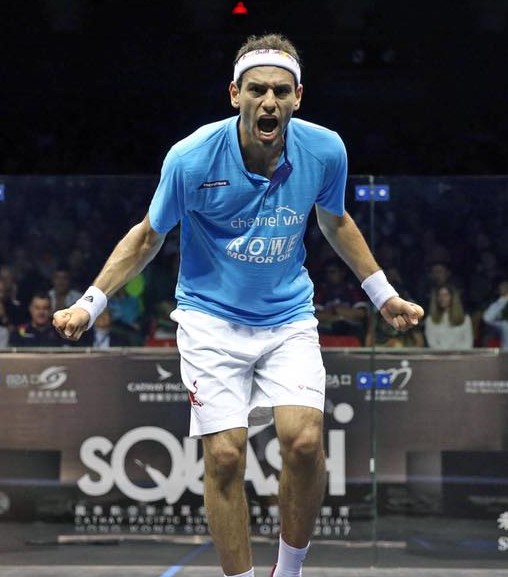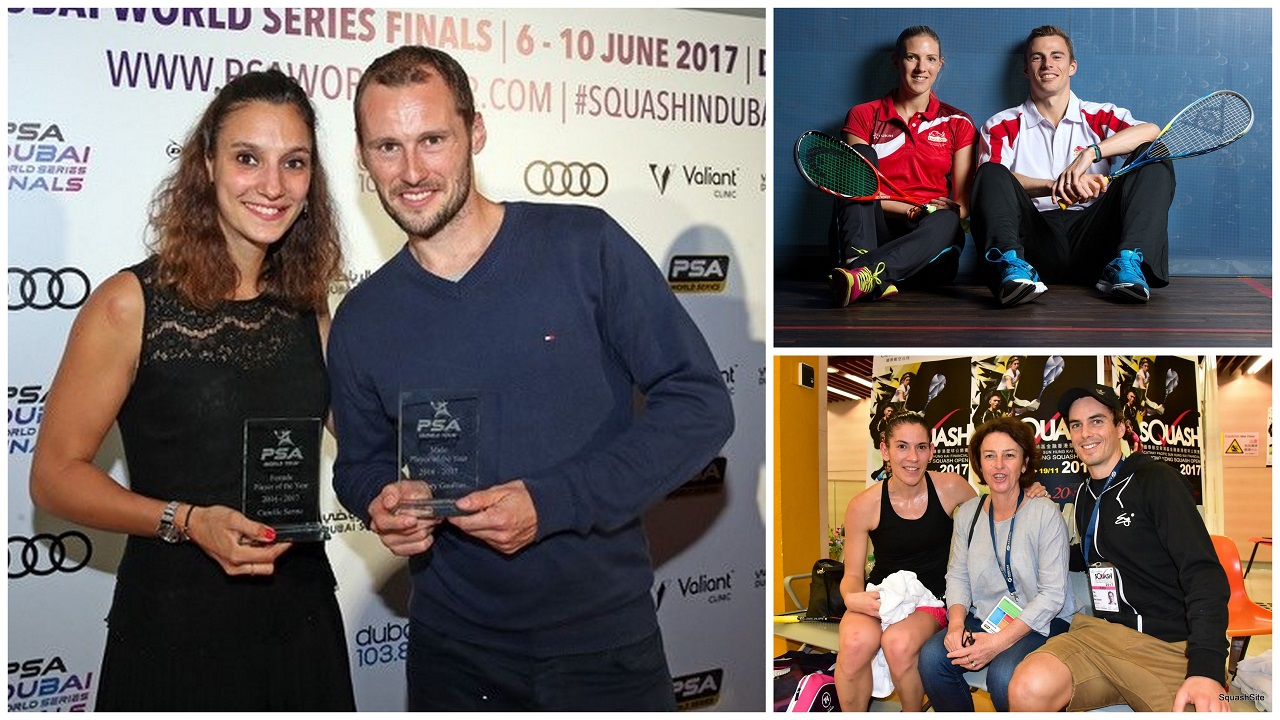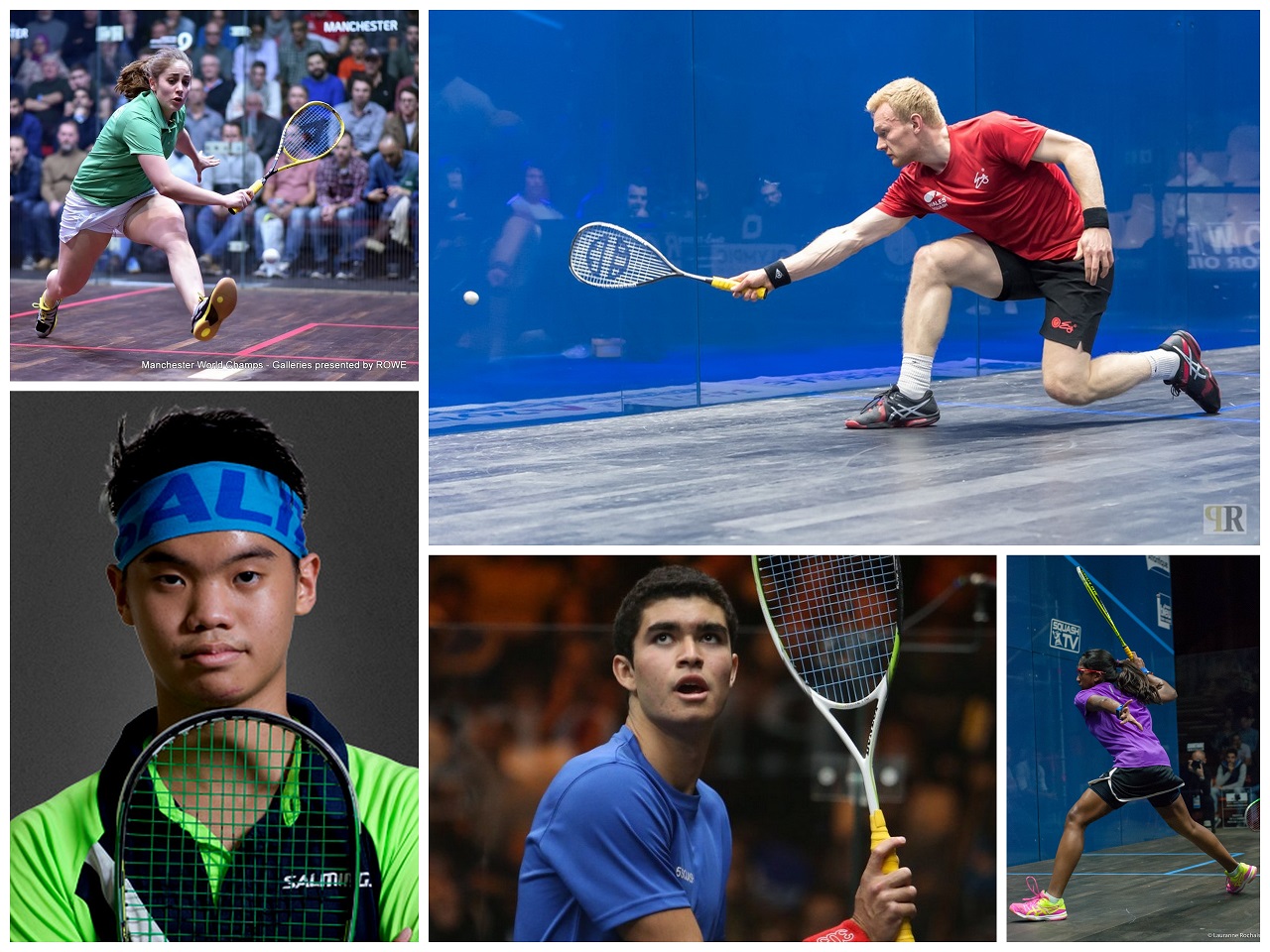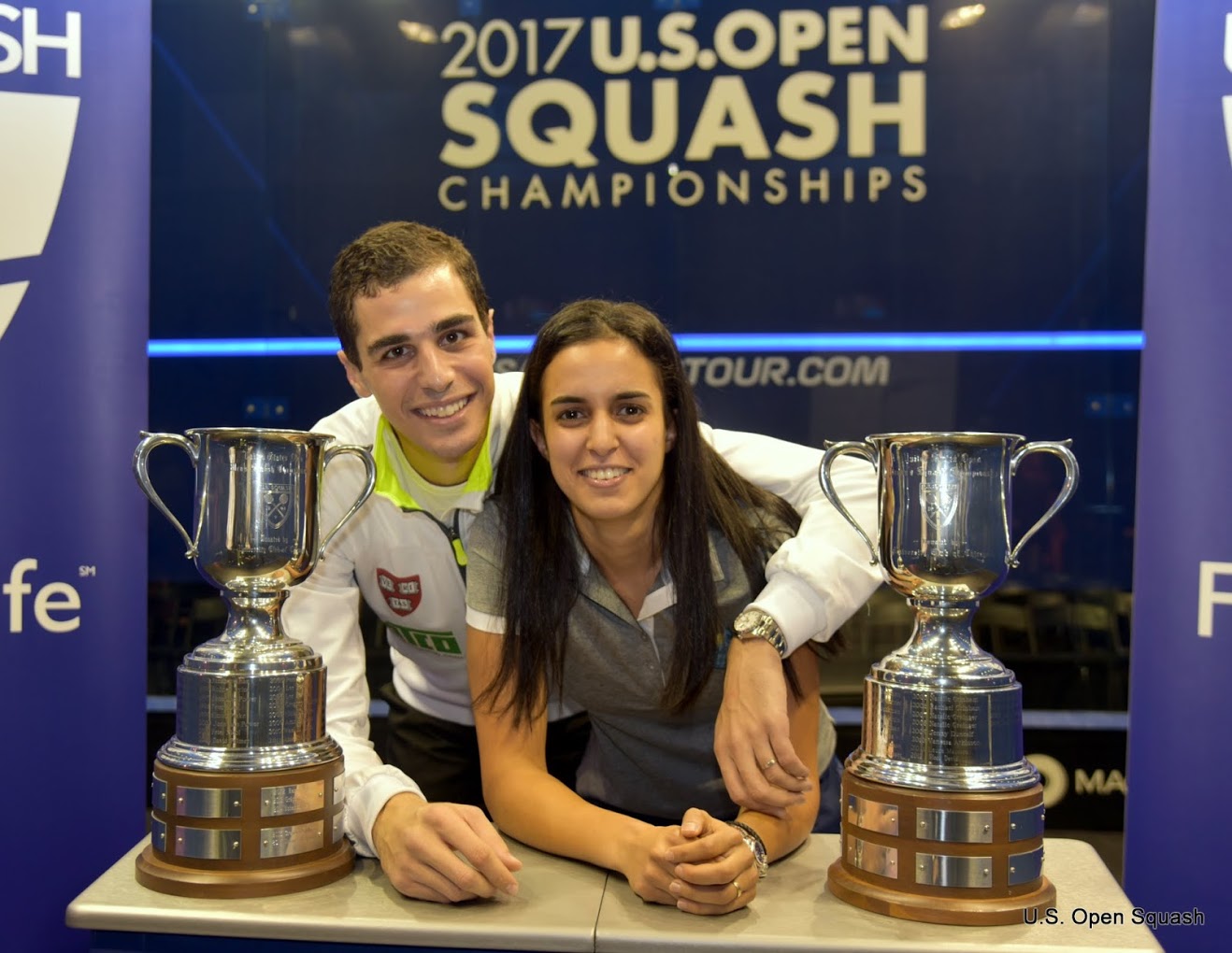2017 Review
Published :
2017-12-26 11:35:18
Categories :
Squash news around the world
The end of the year is traditionally the opportunity to look back into the past twelve months. Today, we offer you a quick review of what happened this year in squash through a few facts. Goodbye 2017 and hello to 2018 ...
1 - Egypt at the top of the squash pyramids
The start of the 2017-2018 season has been exceptional for Egyptian players (Photo credits: SquashSite, PSA World Tour, US Open Squash, Squashmad)
To say that Egypt is the squash main powerhouse at the moment is nothing new, but it must be underlined that this domination has been going stronger and stronger since the beginning of 2017-2018. After the triumph of the men's team a few weeks ago at the World Championship in Marseille, Howard Harding – rightly considered as Mr Statistics in the sport – had stressed that the Pharaohs were now holding all the major world titles, barring the World Junior Team Championship (author's note: they were beaten by Pakistan in 2016 in controversial circumstances. Two of their opponents' players were suspected of being overaged but the investigations did not lead to any conclusion). Egypt's representatives have emphasized that trend even more at the PSA World Championship in Manchester a few days ago, where Raneem El Welily and Mohamed El Shorbagy clinched their first World title. Players from other nations played a major part in the first semester of 2017 (see below Squash is universal), but Egyptian players have been merciless since the beginning of September: every single of the 11 finals of the major tournaments (World Series as well as $100,000) were all-Egyptian affairs! This obviously translates into the world rankings, with five men and four women in the top 10s. And looking at their age (they are all between 20 and 29 years old), this is not likely to stop in the short term future…

Who can stop Mohamed El Shorbagy? (Photo credit: Mohamed Elshorbagy)
Even if many other male Egyptian players shone (such as Momen, his younger brother Marwan and above all Farag), the one who best represents this endless hunger is Mohamed El Shorbagy. He had occupied the world number 1 spot for 28 months, before going through a complicated period from November 2016 to May 2017. The Alexandria-born had already shifted the momentum when he won the World Series Finals in June in Dubai, and he's been almost unstoppable in the last few months: he's won 28 of his 29 matches on the PSA World Tour, clinching five trophies in the process. Opting not to play the World Teams helped him to arrive fresh in Manchester, and to put his hands on the sole major title that was eluding him (author's note: at the expense of his brother in the final, which was a first in squash history). Grégory Gaultier should hold on to his number 1 spot in the January rankings, but the Frenchman will have a lot of points to defend until the end of season. Unlike Elshorbagy, who will be hard to beat if he keeps showing the same determination and composure in the crucial points. The situation is a little different in the women's game, where Nour El Sherbini, Raneem El Welily and Nour El Tayeb (see below El Tayeb - Farag, the couple who wrote history) shared silverware in the major events.
2 - El Tayeb - Farag, the couple who wrote history
As we mentioned above, Egyptian doubles have been nothing but common these last few months, but this one had something special: on the 15th of October, Nour El Tayeb and Ali Farag made history at the US Open, becoming the first married couple to win the same major sports title on the same day. But they also wrote their own history, clinching one after the other their first World Series title. While it was obvious that Farag (member of the world top 5 since the end of last season) had the potential to rapidly reach such highs, El Tayeb (14th in the world rankings before the event) caused a massive upset in Philadelphia. The former World Junior Champion had been struggling to get back to her best since a serious shoulder injury in 2015, but she raised the bar in Philly, beating three players among the world top 4 (Nour El Sherbini, Laura Massaro and Raneem El Welily) thanks to amazing attacking displays. A few weeks ago, Farag had been looking back into this special day: "Unlike what people might think, it's not a disadvantage when Nour plays right before me. I am so involved in her match that it takes away the stress of my own match. Also, when she won, it gave me a huge boost. I felt something was written in the clouds that we would both do it together that day. It definitely sank in after ALL of this media buzz that it got. The fact that we’re the first married couple to ever win a sporting major title together on the same day in history grabbed the attention of lots of papers and channels, but I think we both did a great job to put that behind us and focus on the following tournaments as the season is still quite long ahead and we want to keep repeating the same US Open story again and again." They haven't been able to fulfill this wish yet, but at 24 and 25 years old respectively, time is surely on their side.
Ali Farag and Nour El Tayeb made sporting history in October at the US Open (Photo credit: US Open Squash)
3 - Squash is universal
Admittedly, Egypt did not leave many opportunities for others to shine since the beginning of the new season, but before that there were players from other nations who were very much under the spotlight in the first semester. Such as Camille Serme and Laura Massaro (victorious at the British Open as well as the World Series Finals), and of course Grégory Gaultier. The French General was beyond incredible between February and May, having the best spell of his already brilliant career, at 35-year old: 27 consecutive wins on the PSA World Tour - which allowed him to clinch five trophies including three World Series - and a Team European Champion title on top of that. This unbeaten streak pushed him back to world number 1, a spot he's still seating on despite having had some injury issues since the new season started. Elsewhere, English squash suffered a major blow at the PSA World Championship, since it was the first time there were none of their women's in the quarterfinal stage. There are some concerns regarding the age of their leaders (Matthew, Selby, Willstrop, Massaro and Waters are 33 years old or more), but younger players have been showing that they might be ready to fill their shoes: Sarah-Jane Perry, who's been a contender in major events for some time now, and more recently Declan James. Besides France and England, New Zealand could be informally ranked as the fourth biggest squash country, boasting two players in the world top 10s (Paul Coll and Joelle King, who were also featuring in the quarters in Manchester).

Squash is not only about Egypt and other nations played a significant part in 2017, whether they are men or women (Photo credits: Paul Cooper, PSA World Tour, SquashSite)
One of squash main features is its universality: Peru's Diego Elias (only player under 22 in the world top 50) had been displaying exceptional form at the beginning of 2017-2018 before sustaining an injury in Qatar, but every expert is seeing a bright future for him. Other players who reached latter stages in major tournaments lately include Simon Rosner (Germany), Saurav Ghosal (India), and Miguel Angel Rodriguez (Colombia), all in their thirties. There are also some younger faces who showed some great potential in 2017: Greg Lobban (Scotland, 25 years old), Abdulla Al Tamimi (Qatar, 23), Joel Makin (Wales, 23), and Eain Yow Ng (Malaysia, 19). Let's not forget Tsz Fung Yip (24 years old), who clinched an historical bronze medal at the MWTC with his Hong Kong's teammates. As far as women's are concerned, Malaysian legend Nicol David is no longer a favourite in World Series events but still consistently reaching the quarters. Youngsters also made significant progress this year: Olivia Blatchford (USA, 24 years old), who stepped up after Amanda Sobhy's serious injury, Tesni Evans (Wales, 25), Nele Gilis (Belgium, 21), Hollie Naughton (Canada, 23), and finally a player that many observers view as a future great: 18-year old Sivasangari Subramaniam from Malaysia.

Young and promising players came up in all the continents, from South America (with Diego Elias) to Malaysia and Wales (Photo credits: Philippe Rochais, Lauranne Rochais, SquashSite, PSA World Tour, Nash Cup)
4 - Squash is trying new things
In the last few weeks/months, there have been several initiatives aiming at making the sport more attractive. Fight Night in Houston at the beginning of year ($50,000 prize money, best of 7 games with a champion's belt due to be at stake again in 2018), then the England vs. Rest of the world match in December (four players on each side with a new format, where every point counts with bonuses for games and matches won). More recently, World Squash Federation's president Jacques Fontaine stated they were thinking of a completely new format in order to optimize their chances of inclusion in the Olympics (three 15-minute games). Finally, the Professional Squash Association had announced at the beginning of October that the 2018 Canary Wharf Classic would be the first ranking event to be played using a best-of-three games scoring format. Naturally, all these proposals caused mixed reactions: enthusiasm from those who tend to go towards innovation, disagreement from the squash purists, and skepticism from others. Ali Farag perfectly summarized them in a very interesting column titled Grow or Die, published in July. For the Egyptian, it is obviously necessary to preserve the essence of the game, but also not to forget that substantial changes were made and accepted more recently that one might remember. And above all, that there is no reason not to try new things and then not implement them if they don't work.

Whether it is during exhibition matches and soon ranking tournaments, new things are constantly being tried to make squash even more appealing to the viewers (Photo credits: AB initio international, Squash mad, Hutkay.fit)
January hotspots
--- For the first time, the British Junior Open will be held in Birmingham, from January 3rd to 7th. It's also the first time that there will be U11 events. Can Egypt do better than last year, where they clinched 6 of the 8 titles? 7 of the 10 number 1 seeds are Egyptian, including World Junior Champion Marwan Tarek in U19. In the girls' draw, could there be a first non Egyptian winner since Emily Whitlock in 2013? Sivasangari Subranamiam will be hot favourite, especially since all the best Egyptian players have withdrawn (World Junior Champion Reda El Araby and El Hammamy). The host country's best hopes will be carried by Sam Todd, seeded #1 in U15, a category where he clinched the bronze medal last year at only 13-year old.

The British Junior Open will be the first major event of 2018 (Photo credit: British Junior Open Squash)
There will be two major events on the PSA World Tour in January, starting with the Saudi PSA Masters, due to be played at the end of November but postponed because of logistics isssues. Nour El Sherbini is of course #1 seed, and other players in her half of the draw are Alison Waters, Joelle King and Nouran Gohar. Newly-crowned World Champion Raneem El Welily is seeded to play SJ Perry in the quarters and Camille Serme in the semis. Female players will only have a few days rest before flying to NYC for the prestigious Tournament of Champions, and semi-finals if things go according to seedings would be El Sherbini v Massaro and titleholder Camille Serme v El Welily. One of the highlights of the week will be the return of home crowd favourite Amanda Sobhy, who's been out of action since March because of injury. Grégory Gaultier is top seed in the men's draw and due to meet old rival Nick Matthew in the quarters. Other potential clashes at this stage are Marwan El Shorbagy v 2017 winner Gawad, Farag v Coll and Momen v Mohamed El Shorbagy. X-factor Ramy Ashour could face Paul Coll in round 2, but there are also a few enticing first round matches: Rosner v Selby, Momen v Abouelghar, Willstrop v Pilley and Mosaad v Cuskelly.
ResultsPSA
Winners: Mohamed El Shorbagy (Egypt) and Raneem El Welily (Egypt)
Winner: Marwan El Shorbagy (Egypt)
Winner: Annie Au (Hong Kong) SchedulePSA
Others
|



